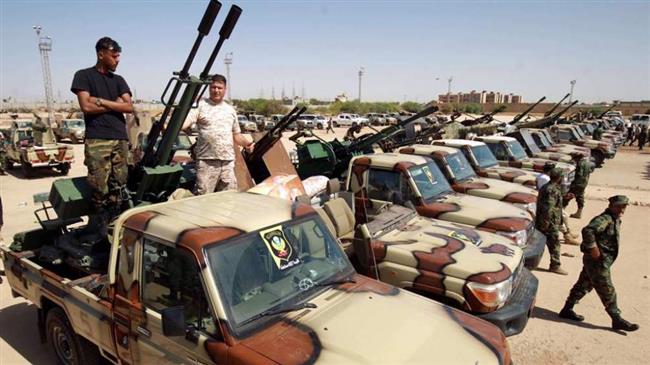
The Guardian newspaper revealed the findings in a report on Wednesday, saying they were part of a joint probe with the investigative journalism website Bellingcat and the media non-profit organization Lighthouse Reports.
Citing flight data and satellite images, the UK-based daily said both the UAE and Turkey were using large military cargo planes to transport military forces and goods to the nine-year conflict in Libya.
“The arms embargo remains totally ineffective,” the Guardian quoted an unknown diplomat with knowledge of a forthcoming UN report on Libya as saying. “In the case of those member states directly supporting the conflict, the violations are extensive, blatant and with complete disregard for the sanctions measures.”
The daily said Turkey has been using Airbus A400M military cargo jets to supply their forces on the ground in western Libya, adding that the planes flew regularly between Turkish airports in Istanbul, Gaziantep and Kayseri to Misrata in Libya throughout June, July and August.
Videos posted on social media of the forces, allegedly Syrian militants chatting and lining up to board a plane in Gaziantep, suggest that some of these flights transported mercenaries, the British paper added.
“The Turkish air force used a new route to avoid certain flight information regions,” the diplomat said. “All flights are non-scheduled or special charter flights that attempt to disguise their routes by switching their transponders off.”
A senior source at Turkey’s defense ministry rejected the report and told the Guardian that the country’s activities in Libya were focused on clearing explosives left by rebel groups under the command of renegade Libyan general Khalifa Haftar, providing humanitarian assistance and running hospitals.
“All of Turkey’s activities related to Libya are within this framework and in accordance with international law,” they said. “There is no violation of any decision, sanction or international law. Our military flights are solely to transport essential materials needed by our staff in fulfilling their mission in Libya, among others for mine clearing, and medical and technical supplies for the hospital run by Turkey.”
As for the UAE, the Guardian said Abu Dhabi was using some of their fleet of massive long-haul military transport aircraft C-17 Globemaster to fly regularly to two remote military air bases, Sidi Barrani, in Egypt’s western desert region bordering eastern Libya, and Gianaclis, near Alexandria.
The military airbases on Egypt’s border with Libya are key to the UAE’s efforts to support rebel groups and militias commanded by Haftar, the newspaper said.
“What’s on them is either transported by road or picked up by aircraft flying for Haftar,” said the diplomat. “The UN panel has written that this is indirect supply of arms and related material, which is a violation of the resolution.”
Turkey and the UAE both attended a summit in Germany’s Berlin in January and along with nine other states agreed to respect the existing arms embargo on the North African country.
The summit was intended to halt foreign interference via flows of weapons, troops and money into Libya.
The oil-rich country first plunged into chaos in 2011, when a popular uprising backed by a NATO intervention led to the ouster of long-time leader Muammar Gaddafi.
Two rival seats of power have emerged in Libya since 2014, namely the internationally-recognized government run by Prime Minister Fayez al-Sarraj, and the parliament based in the eastern city of Tobruk, supported militarily by Haftar’s rebels.
The Libyan rebels are supported by the UAE, Egypt, and Jordan. They launched an unsuccessful military offensive to seize the capital, Tripoli, and unseat the government in April 2019.
The Libyan military has undone many of the rebels’ gains.







